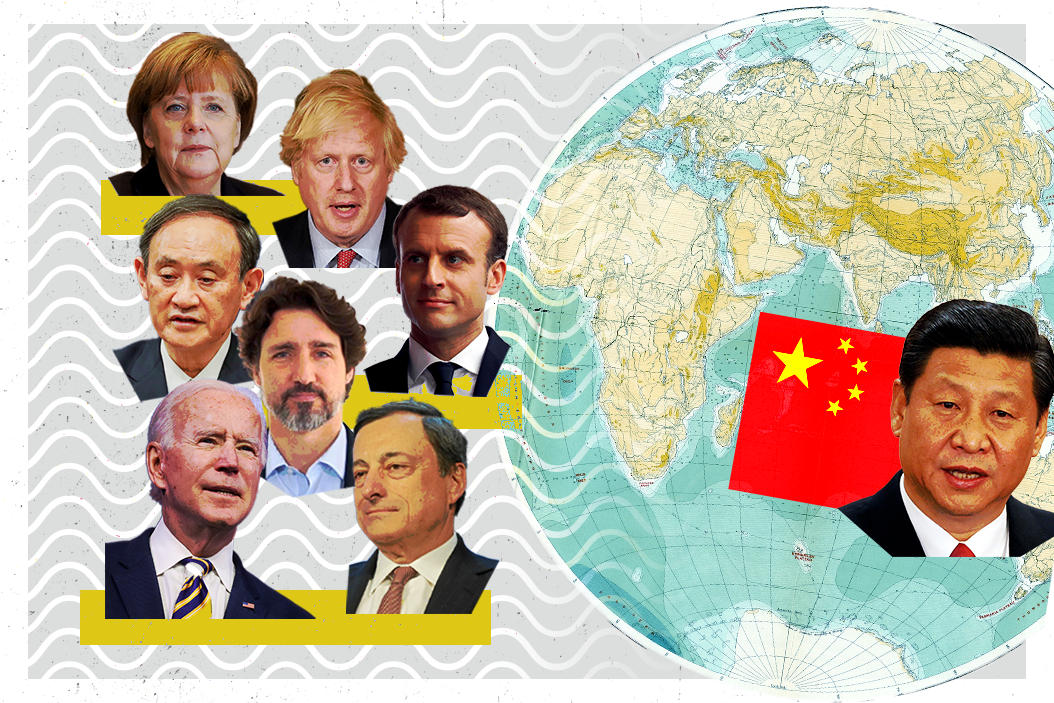June 14, 2021
Over the weekend, the Biden administration announced a G7-backed plan to build climate-friendly infrastructure projects across the developing world. Against the backdrop of rising US-China competition, the plan is widely perceived as a direct challenge to China's Belt and Road Initiative, which also aims to build roads, ports, and rails across the Global South.
But what is really in the new G7 program — known as "B3W" (Build Back Better for the World) — and what is it meant to achieve? Here are a few questions to ponder.
How will B3W differ from BRI? Quite a bit. B3W is presenting itself as the antithesis of BRI, which has mobilized much-needed funding for infrastructure projects in risky parts of the world that had long been neglected by traditional lenders, but has also been criticized for financing dirty coal plants, ignoring fair bidding processes, displacing vulnerable people, and saddling recipient countries with massive debt owed to China. By contrast, B3W says it'll fund "values-driven" infrastructure projects that align with the Paris Climate Accord, are awarded transparently, deliver long-term benefits to communities, and offer terms that developing nations can afford.
Lofty goals aside, the financing model is also very different. Unlike BRI — which doles out financing provided directly by China or by state-backed Chinese companies — B3W is pinning its hopes on capital markets and US development finance institutions like the Export-Import Bank. G7 countries would not contribute directly, but rather facilitate and guarantee deals for private sector investors who would ultimately foot the bill.
How much money are we talking about here? It's not clear. B3W says for now that it intends to raise "hundreds ofbillions of dollars." But that's a mere drop in the bucket considering that the G7 itself estimates the developing world needs to invest $40 trillion in infrastructure by 2035. The figure is also way behind the $3.7 trillion that BRI, launched in 2013, had secured for over 2,600 projects in more than 100 countries as of mid-2020.
Will there be political strings attached? Technically no, but the plan was unveiled as part of a broader G7 push to band together "like-minded" democracies as a counterweight to China's authoritarianism. It's therefore fair to assume that at least initially B3W will prioritize assisting fellow democracies — including weak ones that have only turned to Beijing because they have difficulty accessing loans from the IMF and other international finance institutions. This could appeal to countries like Zambia, which knows US creditors will want their money back but won't demand copper mines in exchange for debt relief like China.
The unintended consequence of favoring democratic nations could be making authoritarian regimes even more dependent on China to build their energy plants, ports, and roads. This is true for post-coup Myanmar, and for some Central American countries hungry for Chinese cash with no questions asked about human rights or the rule of law.
Could US domestic politics get in the way? Possibly. Standing up to China is just about the only thing Democrats and Republicans can agree on these days. But the Biden administration has yet to clarify what it'll do to help raise the money for B3W in US capital markets, and what — if any — tax incentives will be offered for investments outside the country. What's more, Republicans lawmakers would rather give (some) money for US companies to fix America's own crumbling infrastructure than to build a new port in Asia or a railroad in Africa.
Although Joe Biden keeps telling his G7 buddies that "America is back," they don't buy it... yet. They know that B3W's fate largely depends on the next two election cycles in the US. If it remains a US-led but still multilateral initiative, the project may lose steam if Republicans win back the House and Senate in next year's midterms. And B3W could be doomed if a climate-skeptic Republican candidate who espouses Donald Trump's "America First" principles, perhaps even Trump himself, wins the presidency in 2024.
From Your Site Articles
- US-China: Temperature rising - GZERO Media ›
- China's plans for Afghanistan - GZERO Media ›
- Graphic Truth: One Belt, One Road, Two Worlds? - GZERO Media ›
- The Graphic Truth: Life is actually getting better - GZERO Media ›
- Senate's bipartisan $1T infrastructure bill could double US spending - GZERO Media ›
- The US-China economic competition is heating up, says investor Ray Dalio - GZERO Media ›
More For You
Microsoft unveiled a new set of commitments guiding its community‑first approach to AI infrastructure development. The strategy focuses on energy affordability, water efficiency, job creation, local investment, and AI‑driven skilling. As demand for digital infrastructure accelerates, the company is pushing a new model for responsible datacenter growth — one built on sustainability, economic mobility, and long‑term partnership with the communities that host it. The move signals how AI infrastructure is reshaping local economies and what people expect from the tech shaping their future. Read the full blog here.
Most Popular
- YouTube
On GZERO World, Finnish President Alexander Stubb says that Ukraine and its NATO allies are aligned on a path to a ceasefire but warns that Vladimir Putin will drag out the war, not because he thinks he’ll win… but because he knows he’ll lose.
- YouTube
At the 2026 World Economic Forum in Davos, GZERO’s Tony Maciulis spoke with Ariel Ekblaw, Founder of the Aurelia Institute, about how scaling up infrastructure in space could unlock transformative breakthroughs on Earth.
- YouTube
Who decides the boundaries for artificial intelligence, and how do governments ensure public trust? Speaking at the 2026 World Economic Forum in Davos, Arancha González Laya, Dean of the Paris School of International Affairs and former Foreign Minister of Spain, emphasized the importance of clear regulations to maintain trust in technology.
© 2025 GZERO Media. All Rights Reserved | A Eurasia Group media company.
